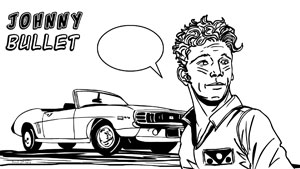|
|
 |
I can’t speak for everyone, but I’m confident in saying that my experience in the world of selling comics isn’t unique. In my teens, when I became a “serious collector,” I faithfully bagged and boarded each issue, cataloguing its condition and value, tracking its value year after year. But then real life got in the way; jobs, final exams, college, girls and car repairs all took their toll on the time I could devote to my hobby. Somewhere in there, the need for cash prompted me to sell off part of my collection, and I went about it perhaps in the most naive way imaginable.
I found an ad for a reputable comic book dealer, which promised a percentage of price guide value. I naively interpreted that as a percentage over the price guide value. I boxed up my comics for shipping, along with an invoice of expected prices for each, and sent them off. A week or so later I received a check in the mail for a fraction of my expected payment, with a note explaining my miscalculation. I was given the option of cashing the check, or sending it back, and they would ship my comics back to me at my expense. Since the combined cost of shipping there and back exceeded the amount of the check, I chose to take the money. And the education.
 |
Any time you approach a dealer to sell your comic books, you automatically give them the advantage. It’s very likely your need for their money outweighs their need for your comics.
This means they will offer you the lowest price imaginable, whether it’s a flat amount for the collection, or a price per box. They will not take the time to price each individual comic book, not unless you have some truly outstanding items in your collection.
Dealers are not collectors, so they generally aren’t concerned with first issues, first appearances, who wrote it, or who drew it. Their criteria for choosing what they buy is based on re-sale value. “How much of a profit can I make in re-selling, and how quickly?”
 |
You can buy a book that will tell you what your comics are worth, but let’s ask ourselves, “Where do those figures come from?” A nameless group of dealers, retailers, collectors and other “experts” make that determination. It’s based on a sampling of prices paid over a given period, coupled with statistical analysis. It’s all very mathematical and perhaps woefully unrealistic.
Adding to its illegitimacy is the idea that the publishers of most price guides are not in the business of buying and selling comics. They sell price guides, and the advertising inside.
Online comic book dealers can sometimes shed light on a book’s values, but if you want to assign a dollar amount to your comic books, visit ebay. See what other collectors are paying on a daily basis for the very same book.
 |
Once upon a time, comic books were disposable. They were intended to be read, traded, read again, and traded again. Repeat, ad infinitum. When bedrooms and basements were cleaned out, comic books were disposed of, along with miscellaneous toys, clothing and other books. As a result, many of the oldest comics have failed to survive more than 10 years after publication.
But then they became collector’s items, to be bagged, boarded, boxed and preserved. Used bookstores began stocking older comics, selling back issues at inflated prices. Comic book shops came into being, and a secondary market evolved. Publishers wanted a piece of this pie, so they republished the most popular, hard-to-find books. Rather than scour comic book stores and convention dealers for individual issues, fans could buy them all in one combined volume for less money. With this material so readily available, the re-sale value of the original comics began dropping.
Then the digital age happened. Online platforms made accessibility as easy as clicking a mouse, without the added expense of printing, binding and distributing. Comics became ethereal electronic documents on a phone or tablet. Suddenly that man-cave of memorabilia gave way to home offices and babies’ rooms.
 |
As I said before, comic books were intended to be read, traded, read again, and traded again. Read them, just as you did when you were a kid, the cover folded back, draped over the arm of a chair when you go to the kitchen for a refill on the root beer. If a little bit of condensation drips, so be it. It’s all good.
They still retain a value, but not the kind that will finance a major purchase. Instead, they become part of what makes you the “cool uncle,” when you share them with a niece or nephew visiting for the weekend.
If you still have hopes of selling your collection, that will require another investment – time. Spend some time online, on various message boards and Facebook pages where collectors congregate. Suss out the collector’s market and proceed with caution as you make it known your collection is available.
Who knows? You just might find a collector with deep pockets willing to store your collection, and pay you for the privilege. As long as you have the electronic versions on a phone or tablet, you’ll be able to read them whenever you like.
This is by no means a complete and comprehensive overview of the merits of comic book collecting. We'll cover more in our next installment. Stay tuned.
© Copyright 2002-2026 by Toon Doctor Inc. - All rights Reserved. All other texts, images, characters and trademarks are copyright their respective owners. Use of material in this document (including reproduction, modification, distribution, electronic transmission or republication) without prior written permission is strictly prohibited.

